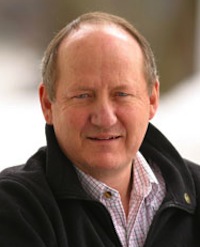Dayton Duncan to deliver first Jordahl Public Lands Lecture Oct. 17
Award-winning author and documentary film producer Dayton Duncan, who wrote and produced “The National Parks: America’s Best Idea,” a six-part documentary directed by filmmaker Ken Burns, will deliver the first annual Jordahl Public Lands Lecture at the University of Wisconsin–Madison.

Duncan
Duncan’s lecture, “Lands for the Public: America’s Best Idea,” will take place on Wednesday, Oct. 17 at 7 p.m. in Mills Hall of the Mosse Humanities Building, 455 N. Park St. The event is free and open to the public.
In addition to “The National Parks,” Duncan and Burns have collaborated on numerous documentaries, including “The Civil War”; “Lewis & Clark: The Journey of the Corps of Discovery”; “Horatio’s Drive: America’s First Road Trip”; and “The Dust Bowl,” which will air on PBS in November.
Duncan has also served as chief of staff to the New Hampshire governor, national press secretary for the Michael Dukakis presidential campaign, chair of the American Heritage Rivers Advisory Committee, and director of the National Park Foundation. He is the author of 12 books, including “Miles from Nowhere: In Search of the American Frontier” and “Out West: A Journey through Lewis & Clark’s America.”
The Jordahl Public Lands Lecture is named in honor of the late Wisconsin conservation leader Harold “Bud” Jordahl, who was instrumental in the creation of the state’s Knowles-Nelson Stewardship Fund, the Apostle Islands National Lakeshore and the Gaylord Nelson Wilderness, and the Northern Great Lakes Visitor Center. Jordahl was also a UW–Madison professor of urban and regional planning, cooperative extension and environmental studies, and he helped found two statewide conservation organizations: Gathering Waters Conservancy and 1000 Friends of Wisconsin.
The 2012 Jordahl lecture is sponsored by the Nelson Institute in partnership with the Wisconsin Academy of Sciences, Arts & Letters; Wisconsin Public Television; Gathering Waters Conservancy; 1000 Friends of Wisconsin, and the UW-Madison Department of Urban and Regional Planning.
Tags: environment, events




